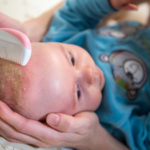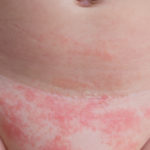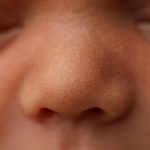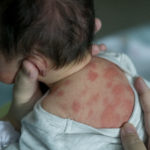
Newborns tend to have very sensitive skin after birth and may develop skin irritations and/or rashes within the first few weeks of life.
Here are some common rashes you might experience with your newborn:
The most common infant rash is diaper rash. The diaper area is a moist environment and this is the main cause of diaper rash. Frequent diaper changes help prevent diaper rash. Barrier creams such as zinc oxide are helpful in healing skin irritations and as a barrier in the diaper area. A diaper rash that has bumps or does not resolve within a few days should be evaluated by a physician.
Newborn Acne (Milia) is another common rash in newborns. Greater than 30% of newborns will develop this rash. Tiny white pimple-like bumps can appear on the nose, cheeks, chin and forehead. Use only water to clean the skin, as soaps are very drying and oils may worsen the condition. Milia usually disappears in 1 – 4 months.
Erythema toxicum affects about half of all newborns in the first 2 to 3 days of life. This is a red blotchy rash with a whitish pimple in the center. The rash may resemble insect bites. It can appear anywhere on the body and disappears within 2 to 4 weeks. It is a completely harmless rash.
Another common skin condition in infants is cradle cap. It appears as red patches with yellow scales or crusts on the scalp. This rash may disappear on its own, but you can help it along by shampooing the area or applying baby oil overnight and using a soft toothbrush to remove the scales.
Any rash that is fluid-filled (blisters or oozing lesions) should be examined and diagnosed quickly by a physician, especially in the first month of life. If you see blisters or fluid-filled pimples call your infant’s pediatrician immediately.
Because of the sensitivity of your newborn’s skin, you should only bathe them 2 – 3 times a week. Clean your baby’s hands and face with warm water whenever they become dirty. Until the umbilical cord falls off, keep it as dry as possible. It will help the cord separate faster. Sponge baths should be used until this happens. Bathe your baby with tap water without soap or with a non-drying baby soap. Pay special attention around the neck folds, chin and face. Dribbling of milk or formula can build up and cause irritation to your infant’s sensitive skin. Soap residue is also irritation so rinse thoroughly.
Little Spurs Pediatric Urgent Care opened in 2006 in San Antonio, Texas. With multiple locations in San Antonio and Dallas, they are open seven days a week with extended evening hours and see walk-in patients or through an online check-in system. They accept most commercial insurance and Medicaid plans. More information about Little Spurs Pediatric Urgent Care can be found at www.littlespurspedi.com.







